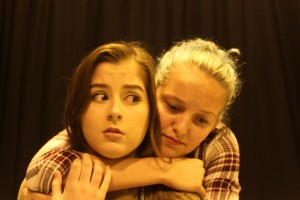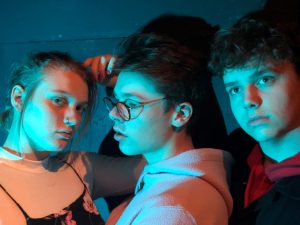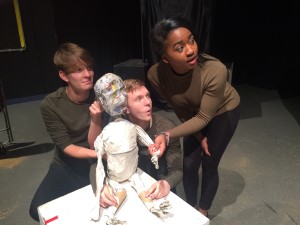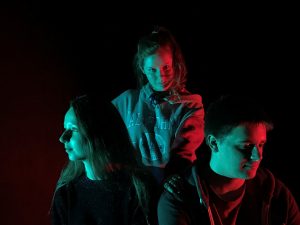Subject Leader
Mr S Thurley – sthurley@oriel.w-sussex.sch.uk
Teaching Staff
Ms E Phillips – ephillips23@oriel.w-sussex.sch.uk
Mr A Reed – areed@oriel.w-sussex.sch.uk




Subject Overview
Drama develops students’ speaking and listening skills, confidence and understanding of the world around them. It also allows for physical expression and use of imagination and develops students’ trust in their creative instinct. In Drama, students use themes, issues and texts to examine a diverse range of social, political and cultural contexts. This, in turn helps them to understand the society in which they are currently living and the nature of the human condition. Drama is an inclusive subject where all students are given the opportunity to develop and learn in a safe and structured environment where originality and creativity flourish. Cross-curricular links can frequently be made in Drama.
Drama lessons usually utilise the following three phases (at different times during the hour).
- Creating Phase – where students react in or out of role to given stimuli
- Performing Phase – students build their ideas and often perform work
- Evaluative Phase – students evaluate and analyse their own work and that of others.
All students are guided to develop and extend their vocabulary to improve analysis within the lessons. Oriel Drama Teachers and students are fully committed to building on an already exciting and supportive department where all students feel safe and relaxed about achieving, trying their best and therefore reaching their full potential.
Key Stage 3 – Performing Arts
Throughout Key Stage Three, students develop their abilities in comprehension and communication. They learn both through and about the art form of Performing Arts. They work both independently and alongside others and learn to take risks with the development of their ideas. Students learn performance skills and about the way in which expression and space help to show meaning to an audience. They learn to analyse their work and the work of others and how to put target setting into practise. Assessment will take place throughout the year where students will accumulate a series of skill sets which will be tested formally and which will form a bank of results leading to one unique, overall grade.
Students are offered 2 pathways at KS4
AQA – GCSE Drama
Progression from Key Stage Three to Key Stage 4 is made through building on and developing the use of Drama techniques previously learnt and learning new ones. Applying these techniques and devices when exploring age appropriate issues and contexts throughout Key Stage Four, students develop their understanding of the world in which they live by studying key playwrights and practitioners and questioning our social climate by exploring a range of different historical contexts.
C1 – Understanding Drama. To be assessed May of Year 11
- Students will study the play The Crucible or Blood Brothers through both practical and theory work. They will develop an understanding of the play from the perspective of an actor, director and technical designer to allow them to answer 4 exam questions on this play.
- Students will also analyse and evaluate a piece of live theatre which they will view at least once over the two years. They will focus on the work of the theatre makers (actors, directors and technical designers) and answer 1 exam question on this play.
C2 – Devising Drama. To be assessed June of Year 10
- Students will work in groups to create a devised piece of drama. In preparation for this this will be taught about applying different styles of theatre to their work, and will explore the work of recognised theatre practitioners.
- Students will also need to complete a devising log which records their process of exploration and creation of work, and evaluates their final performance. Students will perform in front of an audience and will be marked by an examiner.
C3 – Texts in Practice. To be assessed March of Year 11
- Students will perform two extracts from a play which will be chosen in collaboration with their teachers to ensure the text embraces the performance strengths of the student.
- This will be performed in front of an audience, and will be marked by an outside examiner.
Pearson BTEC Level 1/2 in Performing Arts
This qualification is for those students wanting a more practical based industry based learning experience of the performing arts sectors. The qualification recognises the value of learning skills, knowledge and vocational attributes to complement GCSEs. The qualification will broaden learners’ experience and understanding of the varied progression options available to them.
You will studying professionals’ work and processes used, the skills and techniques used in different roles, and how to contribute to the creation of a performance in either a performance or non-performance role as part of your Key Stage 4 learning.
This qualification enables learners to develop their sector-specific skills, such as:
- refining work and applying skills for a performance using realistic vocational contexts,
- working with others, working to deadlines, and responding to feedback through a practical and skills-based approach to learning and assessment.
Component One: Exploring the Performing Arts
Levels: 1/2
Assessment Type: Internal
Guided learning
Hours: 36
Component in brief:
You will develop your understanding of the performing arts by examining practitioners’ work and the processes used to create performance.
Introduction:
To develop as a performer you will need a broad understanding of performance work and influences. To gain a realistic overview of performing arts repertoire, you will learn about the skills and techniques of singing, dancing and/or acting. This component will help you to understand the requirements of being an actor, dancer or musical theatre performer across a range of performances and performance styles. You will develop knowledge and understanding of a range of performance styles. You will look at elements such as roles, responsibilities and the application of relevant skills and techniques. You will broaden your knowledge through observing existing repertoire and by learning about the approaches of practitioners, and how they create and influence performance material. This component will give you an understanding of practitioners’ work and the processes and practices that contribute to a range of performance styles. You will develop transferable skills, such as research and communication, which will support your progression to Level 2 or 3 vocational or academic qualifications.
Learning aims
A Examine professional practitioners’ performance work
B Explore the interrelationships between constituent features of existing performance material.
Component 2: Developing Skills and Techniques in the Performing Arts
Levels: 1/2
Assessment type: Internal
Guided learning Hours: 36
Component in brief
You will develop your performing arts skills and techniques through the reproduction of acting repertoire.
Introduction:
Working as a performer requires the application of skills, techniques and practices that enable you to produce and interpret performance work. You will communicate intentions to an audience through a variety of disciplines such as acting, dancing and musical theatre. In this component, you will develop performance skills and techniques. You will have the opportunity to specialise in one or more of the following disciplines: acting, dance, musical theatre. You will take part in workshops and classes where you will develop technical, practical and interpretative skills through the rehearsal and performance process. You will work from existing performing arts repertoire, applying relevant skills and techniques to reproduce the work. Throughout your development, you will review your own progress and consider how to make improvements. Developing performance skills and techniques will enable you to consider your aptitude and enjoyment for performing arts, helping you to make informed decisions about what you study in the future. This component will help you to progress to Level 3 qualifications in performing arts, where skills and techniques are looked at in more detail. Alternatively, you may want to progress to other Level 3 vocational or academic subject areas. This component has many transferable qualities, for example communication skills and teamwork, which will be valuable whatever you decide to do.
Learning aims
A Develop skills and techniques for performance
B Apply skills and techniques in rehearsal and performance
C Review own development and performance.
Component 3: Performing To A Brief
Levels: 1/2
Assessment type: External
Guided learning hours: 48
Component in brief
You will be given the opportunity to work as part of a group to create a workshop performance in response to a given brief and stimulus.
Introduction
Live performance can happen in a number of places and for a range of reasons. For example, you may perform in a traditional performance space to an audience to communicate ideas about a particular theme or issue, or you may be part of a touring group that takes a performance to a community setting, such as a local school, to teach a young audience a safety message. In this component, you will have the opportunity to respond to a brief. You will be given a brief that outlines the performance requirements and that asks you to consider your target audience and to start the creative process by using the given stimulus included in the brief. Working as part of a group, you will develop your ideas for a workshop performance and apply your skills and techniques to communicate your creative intentions to your audience. The performance skills you will use will vary depending on features such as your performance discipline and the content of the work, your venue and target audience. The work may involve improvisation, vocal work, movement techniques or assisting with audience involvement. The group performance may involve some solo or small-group work or it may be an ensemble piece. You will have the opportunity to inform the performance using existing or newly developed skills, adapting them to suit the performance. This component will help you with progression to Level 2 or 3 vocational or academic qualifications. This component will also enable you to develop transferable skills, such as communication and teamwork, which will help you to progress onto further study.
Students are offered two pathways at Key Stage 5
The Department follows the Edexcel two year A level course.
Component 1: Devising (*Component Code: 9DR0/01)
40% of the qualification, 80 marks
Content overview
- Devise an original performance piece.
- Use one key extract from a performance text and a theatre practitioner as stimuli.
- Centre choice of text and practitioner.
- Performer or designer routes available.
Component 2: Text in Performance (*Component Code: 9DR0/02)
20% of the qualification, 60 marks
Content overview
- A group performance/design realisation of one key extract from a performance text.
- A monologue or duologue performance/design realisation from one key extract from a different performance text.
- Centre choice of performance texts.
Component 3: Theatre Makers in Practice (*Paper Code: 9DR0/03)
Written examination: 2 hours 30 minutes
40% of the qualification, 80 marks
Section A: Live Theatre Evaluation
- 20 marks, assessing AO4.
- Students answer one extended response question from a choice of two requiring them to analyse and evaluate a live theatre performance they have seen.
- Students are allowed to bring in theatre evaluation notes of up to a maximum of 500 words.
Section B: Page to Stage: Realising a Performance Text
- 36 marks, assessing AO3.
- Students answer two extended response questions based on an unseen extract from the performance text they have studied.
- Students will demonstrate how they, as theatre makers, intend to realise the extract in performance.
- Students answer from the perspective of a performer and a designer.
- Performance texts for this section are not allowed in the examination as the extracts will be provided.
Section C: Interpreting a Performance Text
- 24 marks, assessing AO3.
- Students will answer one extended response question from a choice of two based on an unseen named section from their chosen performance text
- Students will demonstrate how their re-imagined production concept will communicate ideas to a contemporary audience.
- Students will also need to outline how the work of their chosen theatre practitioner has influenced their overall production concept and demonstrate an awareness of the performance text in its original performance conditions.
- Students must take in clean copies of their performance texts for this section, but no other printed materials.
We also offer:
Pearson BTEC Level 3 National Extended Certificate in Performing Arts
Equivalent in size to one A Level.
4 units, of which 3 are mandatory and 2 are external.
The Extended Certificate is for learners who are interested in learning about the performing arts sector alongside other fields of study, with a view to progressing to a wide range of higher education courses, not necessarily in performing arts. It places an emphasis on fundamental skills which are transferable across other sectors (including communication, presentation, physical and creative skills).
| 1 | Investigating Practitioners Work | Externally Assessed | Learners investigate the work of performing arts practitioners and develop critical analysis skills and contextual understanding of how practitioners communicate themes in their work. In this unit you will: • Demonstrate knowledge and understanding of contextual factors that influence work of performing arts practitioners. • Apply knowledge and understanding of how contextual factors influence the creative intentions and themes of performing arts practitioners. • Apply critical analysis skills to develop and demonstrate understanding of performance, production, and repertoire |
| 2 | Developing Skills and Techniques for Live Performance | Internally Assessed | Learners explore technical performance skills with a focus on developing skills and techniques in at least two performance styles. In this unit you will: • Understand the role and skills of a performer. • Develop performance skills and techniques for live performance. • Apply performance skills and techniques in selected styles. Review and reflect on development of skills and techniques for live performance. |
| 3 | Group Performance Workshop | Externally Assessed | Learners explore and integrate creative, physical and vocal skills and techniques, working collaboratively to create a performance in response to a given stimulus. In this unit you will: • Understand how to interpret and respond to stimulus for a group performance. • Develop and realise creative ideas for a group performance in response to stimulus. • Apply personal management and collaborative skills to a group performance workshop process. Apply performance skills to communicate creative intentions during performance workshop AO5 Review and reflect on the effectiveness of the working process and the workshop performance |
| 4 | Optional Choice See Brief Outline | Internally Assessed | There are a number of other optional units to choose from which include: • Acting Styles • Developing the Voice for Performance • Improvisation • Movement in Performance • Musical Theatre Techniques • Variety Performance |
Learning Outside the Classroom
Extra-Curricular
The Drama department also offer opportunities for students to take part in a range of extra-curricular activities, for example theatre trips, whole school productions, Drama club and supported study after school hours.
Many students take every opportunity they can to perform!
Upcoming / ongoing extra-curricular activities in Drama include:
- Planned production of 9 to 5, Autumn 2023
- Oriel Extras, a student run company, to maintain an ongoing series of events
- National Youth Theatre entries 2023-24
- Friends of Frantic Assembly
- Sound and Light Club
